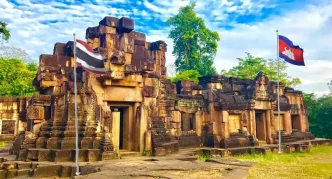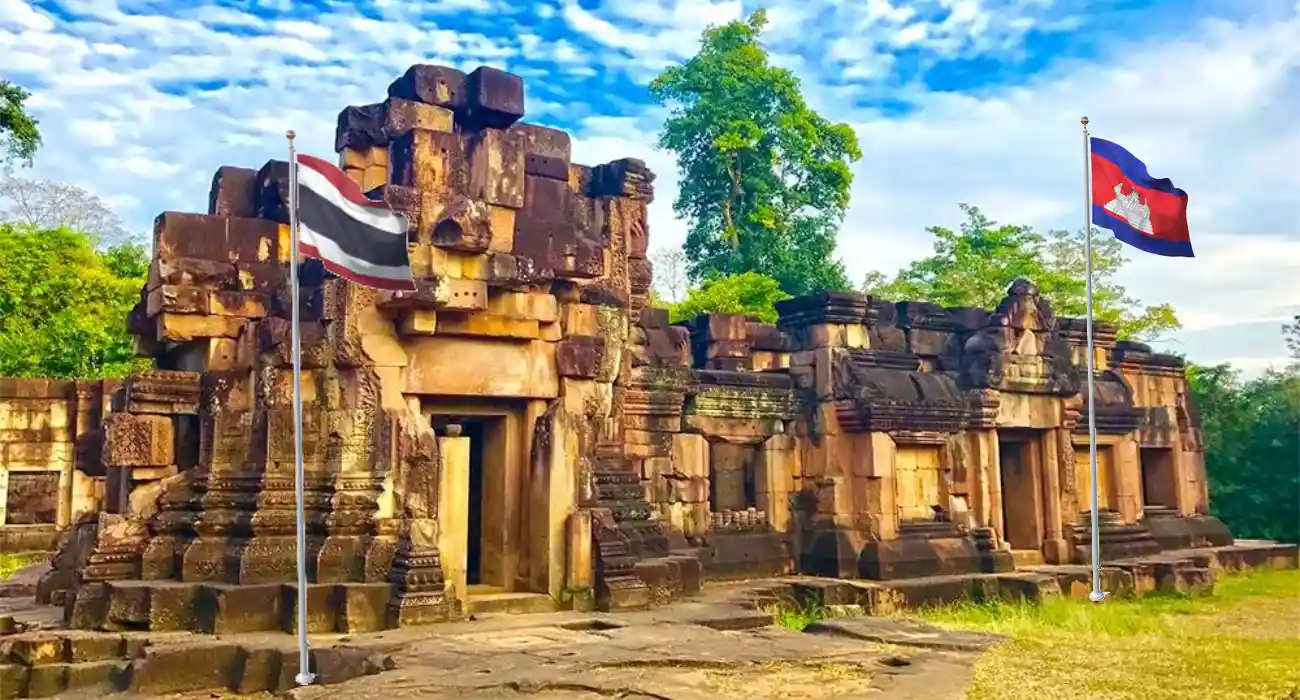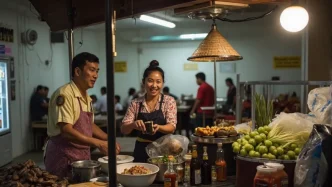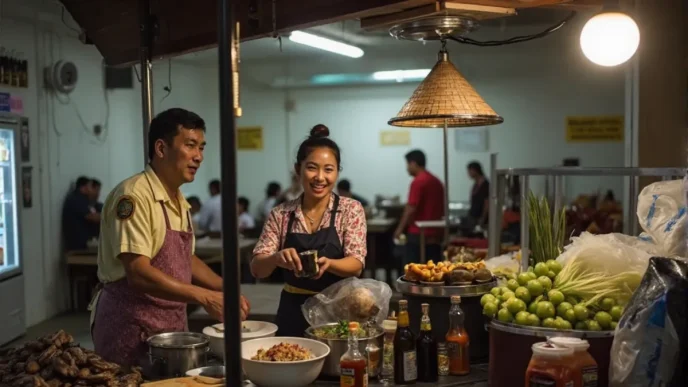Cambodia has taken a significant step in its long-standing territorial conflict with Thailand by formally submitting a letter to the International Court of Justice (ICJ) in The Hague, seeking resolution over a contentious border area involving four key locations, including the ancient Khmer temple of Prasat Ta Moan Thom. The move, initiated on June 15, 2025, underscores Phnom Penh’s determination to protect its territorial integrity through international legal mechanisms, even as bilateral talks with Bangkok falter.
A Renewed Push for Legal Resolution
The Cambodian government’s submission to the ICJ, delivered on June 16 by Ambassador to the Netherlands Kim Suor Sovannary, focuses on four disputed areas along the Cambodian-Thai border in Oddar Meanchey province: the Mum Bei area, and the temples of Ta Moan Thom, Ta Moan Tauch, and Ta Krabei. The letter, handed directly to ICJ Registrar Philippe Gautier, marks a formal escalation after recent bilateral discussions under the Joint Border Committee (JBC) framework failed to address these specific points during a meeting held in Phnom Penh on June 14-15.
Cambodian Prime Minister Hun Manet emphasized the government’s resolve in a social media post on June 16, stating: “Cambodia will not back down from using legal mechanisms through the ICJ to seek a resolution to the Cambodia-Thailand border issue concerning Ta Moan Thom Temple, Ta Moan Tauch Temple, Ta Krabei Temple and the Mum Bei area.” He further affirmed that the Royal Government would pursue this effort with “determination and responsibility” to safeguard the nation’s territorial integrity and the interests of the Khmer people.
The disputed sites, particularly Prasat Ta Moan Thom—known as Prasat Ta Muen Thom in Thai—are culturally and historically significant to both nations. Located on the border, these ancient Khmer temples have been flashpoints for decades, symbolizing deeper tensions over sovereignty and national identity. The presence of Thai soldiers guarding the area, as observed on March 26, 2025, highlights the ongoing militarization of the border zone and the stakes involved in resolving ownership.
Thailand’s Reluctance and Bilateral Frustrations
Thailand, however, has expressed disappointment over the exclusion of these four locations from the recent JBC talks. Nikorndej Balankura, spokesperson for Thailand’s Ministry of Foreign Affairs, noted on June 16 that the failure to discuss these points “is a disappointment for Thailand” and maintained that they fall within the JBC framework for resolution. Bangkok has historically been wary of involving the ICJ in border disputes, a stance rooted in past rulings that have favored Cambodia, most notably the 1962 decision on the Preah Vihear Temple, which Thailand has long contested.
The Thai Foreign Ministry has explicitly ruled out settling the current disputes through the ICJ, signaling a preference for bilateral negotiations despite Cambodia’s legal maneuver. This divergence in approach—Cambodia’s push for international adjudication versus Thailand’s insistence on dialogue—has deepened the impasse, raising questions about the effectiveness of existing mechanisms like the JBC in addressing complex historical claims.
Adding to the tension, recent reports suggest Cambodia has threatened to ban Thai fruit and vegetable imports as leverage in the border row, a move that could strain economic ties between the two neighbors. Meanwhile, Thai Prime Minister Paetongtarn Shinawatra has vowed not to yield to what she described as “threats,” following an ultimatum from Cambodian Senate President Hun Sen, though specifics of the statement remain unclear. Such rhetoric underscores the potential for the dispute to spill over into broader diplomatic and economic arenas.
Historical Context and the Weight of Precedent
The Cambodia-Thailand border dispute is steeped in a history of colonial-era delineations and post-independence conflicts. The boundary, much of which was drawn under French colonial influence in the early 20th century, has long been a source of contention, particularly around culturally significant sites like the Khmer temples that dot the region. The ICJ’s 1962 ruling on Preah Vihear, which awarded the temple to Cambodia, remains a sore point for Thailand, which argues that the court overstepped its jurisdiction and ignored practical control on the ground.
That precedent looms large over the current case. Cambodia appears to be banking on the ICJ’s historical inclination to prioritize legal documentation and international treaties, such as the 1904 and 1907 Franco-Siamese agreements, over Thailand’s claims of de facto control. However, enforcing any potential ICJ ruling could prove challenging, as Thailand’s past reluctance to fully comply with the Preah Vihear decision suggests a pattern of resistance to international adjudication.
The four disputed areas now before the court are not merely territorial but deeply symbolic. Prasat Ta Moan Thom, for instance, is a 12th-century Khmer temple complex tied to the Angkorian era, a source of immense pride for Cambodians as a marker of their historical legacy. For Thailand, control over border areas near these temples is often framed as a matter of national security and sovereignty, particularly given the proximity to conflict-prone regions.
Regional Implications and International Oversight
The escalation to the ICJ carries implications beyond the immediate border. Both Cambodia and Thailand are members of the Association of Southeast Asian Nations (ASEAN), a bloc that prioritizes non-interference and consensus in resolving disputes. While ASEAN has mediated past flare-ups between the two countries, including violent clashes near Preah Vihear in 2011, its influence over deeply entrenched territorial issues remains limited. Cambodia’s unilateral move to the ICJ could test ASEAN’s cohesion, potentially drawing criticism from other members wary of external judicial involvement in regional matters.
Internationally, the case may also draw attention to the role of global institutions like the ICJ in resolving post-colonial border disputes, a recurring challenge across Asia and Africa. If Cambodia’s submission progresses to a full hearing, it could set a precedent for other nations seeking legal recourse over similar historical grievances, though the court’s ability to enforce rulings remains a perennial concern.
Economically, the border row threatens to disrupt cross-border trade and local livelihoods. The Oddar Meanchey province area, while remote, serves as a conduit for informal trade and movement between the two countries. Cambodian threats to restrict Thai agricultural imports, if acted upon, could impact Thai farmers and escalate retaliatory measures, further straining relations. Additionally, unrelated reports of Cambodian fishing crews reluctant to return home due to disputes with Thai fisheries associations highlight the broader undercurrents of mistrust affecting communities on both sides.
Public Sentiment and Domestic Pressures
In Cambodia, the government’s decision to pursue the ICJ route has been framed as a patriotic stand, resonating with a public sensitive to historical losses of territory. Prime Minister Hun Manet’s public statements reflect a calculated effort to rally domestic support, positioning the legal battle as a defense of Khmer heritage and sovereignty. However, any perceived failure to secure a favorable outcome could invite criticism, particularly if prolonged ICJ proceedings delay tangible progress on the ground.
In Thailand, the border issue is equally emotive, often exploited by nationalist factions to stoke anti-Cambodian sentiment. Prime Minister Paetongtarn faces domestic pressure to adopt a hardline stance, especially in light of Hun Sen’s reported ultimatum. Conceding to ICJ jurisdiction risks political backlash, yet continued deadlock with Cambodia could undermine Thailand’s regional standing and economic interests.
Looking Ahead: A Path to Resolution?
As Cambodia’s submission awaits consideration by the ICJ, the immediate future of the border dispute remains uncertain. The court may take months to decide whether to accept jurisdiction, and even then, a final ruling could be years away. In the interim, both nations face the challenge of managing tensions to prevent military or diplomatic escalations, a task complicated by historical animosities and domestic political dynamics.
For local communities near the disputed temples, the stakes are both cultural and practical. The militarized border, exemplified by Thai soldiers standing guard at Prasat Ta Moan Thom, serves as a daily reminder of unresolved grievances. Whether through the ICJ or renewed bilateral efforts, a sustainable resolution will require not just legal clarity but mutual recognition of shared history and the need for coexistence.
As the case unfolds in The Hague, questions linger over whether international law can bridge the divide where diplomacy has stumbled. For now, the ancient stones of Ta Moan Thom and its neighboring temples stand as silent witnesses to a conflict that continues to shape the destinies of two nations.
















